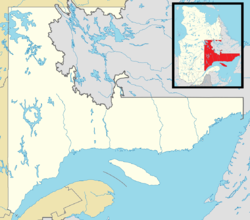Lac-au-Brochet, Quebec
Lac-au-Brochet | |
|---|---|
 Location within La Haute-Côte-Nord RCM. | |
| Coordinates: 49°40′N 69°36′W / 49.667°N 69.600°W[1] | |
| Country | |
| Province | |
| Region | Côte-Nord |
| RCM | La Haute-Côte-Nord |
| Constituted | January 1, 1986 |
| Government | |
| • Federal riding | Montmorency—Charlevoix —Haute-Côte-Nord |
| • Prov. riding | René-Lévesque |
| Area | |
| • Total | 10,176.70 km2 (3,929.25 sq mi) |
| • Land | 9,360.33 km2 (3,614.04 sq mi) |
| Population (2021)[3] | |
| • Total | 0 |
| • Density | 0.0/km2 (0/sq mi) |
| • Pop 2016-2021 | |
| • Dwellings | 7 |
| Time zone | UTC−5 (EST) |
| • Summer (DST) | UTC−4 (EDT) |
| Highways | No major routes |
Lac-au-Brochet is an unorganized territory in the Côte-Nord region of Quebec, Canada. It makes up over 83% of the La Haute-Côte-Nord Regional County Municipality.
The community of Labrieville (49°18′00″N 69°33′50″W / 49.30000°N 69.56389°W) is located approximately in the centre of the territory along the Betsiamites River. Named after Napoléon-Alexandre Labrie, bishop of the Diocese of Golfe St-Laurent, it was established in the 1950s as a work camp to accommodate Hydro-Québec workers constructing the Bersimis-1 and Bersimis-2 generating stations. The company town was fully serviced with a hospital, hotel, bank, and shopping plaza. Upon completion of the hydro-electric facilities, Hydro-Québec tried to find another buyer for the town. But this proved unsuccessful, and they transferred most houses and businesses to Forestville in 1974.[4] The community now serves as an access point to the Labrieville ZEC but doesn't have any permanent resident.
The eponymous Brochet Lake is about 20 kilometres (12 mi) north-east of the Pipmuacan Reservoir and just over 30 kilometres (19 mi) north of Labrieville. It has a surface area of nearly 45 square kilometres (17 sq mi), and is drained by the Brochet River, a tributary of the Betsiamites. Named after the northern pike (French: brochet), the Montagnais called it Tshinusheu Shakikan, also meaning Pike Lake.[5]
Demographics[edit]
Population trend:[6]
- Population in 2021: 0
- Population in 2016: 5
- Population in 2011: 0
- Population in 2006: 0
- Population in 2001: 0
- Population in 1996: 3
- Population in 1991: 0
See also[edit]
References[edit]
- ^ "Banque de noms de lieux du Québec: Reference number 149767". toponymie.gouv.qc.ca (in French). Commission de toponymie du Québec.
- ^ a b Ministère des Affaires municipales, des Régions et de l'Occupation du territoire - Répertoire des municipalités: Lac-au-Brochet
- ^ a b Statistics Canada 2021 Census - Lac-au-Brochet census profile
- ^ "Labrieville". Histoires oubliées (in French). Les Productions Vic Pelletier inc. Retrieved 2010-06-21.
- ^ "Lac au Brochet" (in French). Commission de toponymie du Québec. Retrieved 2009-06-21.
- ^ Statistics Canada: 1996, 2001, 2006, 2011, 2016, 2021 census

